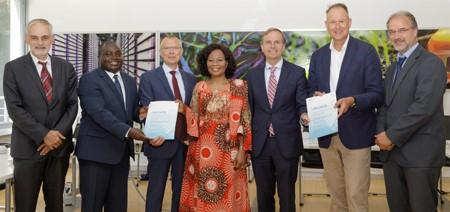

High-level guests attend kick-off event for YESPV-NIGBEN at FZ Jülich
One in five Africans still frequently go without food, and climate change may exacerbate the situation further, as extreme weather events threaten the food supply for a growing population. However, hunger is often a distribution problem. In Nigeria and Benin, farmers can produce enough food, but production is unevenly distributed throughout the year, and at harvest time several hundred thousand tonnes of crops rot unused.
The three-year project YESPV-NIGBEN brings together researchers from Nigeria, Benin and Germany to address this problem. To reduce land use conflicts between agriculture and energy production, they are developing combined "photovoltaic greenhouses" for the cultivation of fruit and vegetables. They are also working towards creating drying systems with solar concentrators, ventilation and management systems. The aim is to make sure that local crops can be stored for longer, and ensure that surpluses can be processed in large quantities.
"Africa is a key partner in the fight against climate change. The aim is to enable Africa to deal with the consequences of climate change, and to build a new partnership for developing a sustainable energy supply. In the YESPV-NIGBEN project, German expertise will help to improve food supplies in West Africa. Through research and innovation, we are supporting sustainable business models and approaches for people in their home countries of Nigeria and Benin," said Thomas Rachel, State Secretary at the German Federal Ministry of Education and Research (BMBF).
Click here for the official press release (in German)
Related articles (in German):
Public Security – Energie und Rohstoff
